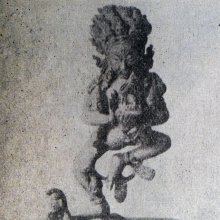Dombi, Ḍōmbī, Ḍombī: 7 definitions
Introduction:
Dombi means something in Buddhism, Pali, Hinduism, Sanskrit, Marathi. If you want to know the exact meaning, history, etymology or English translation of this term then check out the descriptions on this page. Add your comment or reference to a book if you want to contribute to this summary article.
Images (photo gallery)
In Hinduism
Shaktism (Shakta philosophy)
Source: Google Books: ManthanabhairavatantramḌombī (डोम्बी) is the name of a Pallī (village) associated with the Pīṭha named Kaulagiri, according to the Kulakriḍāvatāra, a text paraphrased by Abhinavagupta in his Tāntrāloka.—The lineage (ovalli) Avali is associated with the following:—Prince: Guḍika; Master: Candrabimba; Pīṭha: Kaulagiri; Ghara (house): Aḍabilla; Pallī (village): Ḍombī; Town: Gauḍika; Direction: north-west; Grove: Nārikela; Vow-time: 8 years; Mudrā: right little finger; Chummā: “Genitals”.

Shakta (शाक्त, śākta) or Shaktism (śāktism) represents a tradition of Hinduism where the Goddess (Devi) is revered and worshipped. Shakta literature includes a range of scriptures, including various Agamas and Tantras, although its roots may be traced back to the Vedas.
In Buddhism
Tibetan Buddhism (Vajrayana or tantric Buddhism)
Source: archive.org: The Indian Buddhist IconographyḌombī (डोम्बी) refers one of the eight Gaurīs, commonly depicted in Buddhist Iconography, and mentioned in the 11th-century Niṣpannayogāvalī of Mahāpaṇḍita Abhayākara.—Her Colour is mixed; her Symbol is the banner; she has two arms.—The eighth goddess in the Gaurī group is Ḍombī.
Ḍombī is described in the Niṣpannayogāvalī (pañcaḍāka-maṇḍala) as follows:—
Source: academia.edu: The Structure and Meanings of the Heruka Maṇḍala“Ḍombī is of mixed colour and carries in her right hand the high flag and banner”.
[The left hand displays the common gesture of the tarjanī against the chest.
All the deities are violent in character with fearful appearance and ornaments, and garlands of heads. They dance in pratyālīḍha and show the raised index finger with clasped fist against the chest, as the common gesture.]
Ḍombī (डोम्बी) is the name of a Ḍākinī who, together with the Vīra (hero) named Ḍomba forms one of the 36 pairs situated in the Guṇacakra, according to the 10th century Ḍākārṇava chapter 15. Accordingly, the guṇacakra refers to one of the four divisions of the sahaja-puṭa (‘innate layer’), situated within the padma (lotus) in the middle of the Herukamaṇḍala. The 36 pairs of Ḍākinīs [viz., Ḍombī] and Vīras are whitish red in color; they each have one face and four arms; they hold a skull bowl, a skull staff, a small drum, and a knife.
Note: Ḍombī’s name is Ḍombinī in Jayasena’s Ratnapadmarāganidhi (D 1516, 27 v 1)

Tibetan Buddhism includes schools such as Nyingma, Kadampa, Kagyu and Gelug. Their primary canon of literature is divided in two broad categories: The Kangyur, which consists of Buddha’s words, and the Tengyur, which includes commentaries from various sources. Esotericism and tantra techniques (vajrayāna) are collected indepently.
Languages of India and abroad
Marathi-English dictionary
Source: DDSA: The Molesworth Marathi and English Dictionaryḍōmbī (डोंबी).—f R An obstinate pressing forwards; pushing determinedly on (in spite of resistance). v kara, māra, lāva. 2 Importunate and wearisome begging or urging. v kara, ghāla, ghē.
Source: DDSA: The Aryabhusan school dictionary, Marathi-Englishḍōmbī (डोंबी).—f Obstinate pushing on. Importunate begging.
Marathi is an Indo-European language having over 70 million native speakers people in (predominantly) Maharashtra India. Marathi, like many other Indo-Aryan languages, evolved from early forms of Prakrit, which itself is a subset of Sanskrit, one of the most ancient languages of the world.
Sanskrit dictionary
Source: Cologne Digital Sanskrit Dictionaries: Monier-Williams Sanskrit-English DictionaryḌombī (डोम्बी):—[from ḍomba > ḍoma] f. a kind of drama, [Daśarūpa i, 8 [Scholiast or Commentator]]
Sanskrit, also spelled संस्कृतम् (saṃskṛtam), is an ancient language of India commonly seen as the grandmother of the Indo-European language family (even English!). Closely allied with Prakrit and Pali, Sanskrit is more exhaustive in both grammar and terms and has the most extensive collection of literature in the world, greatly surpassing its sister-languages Greek and Latin.
Kannada-English dictionary
Source: Alar: Kannada-English corpusḌoṃbi (ಡೊಂಬಿ):—
1) [noun] a disorganised collection of persons; a crowd.
2) [noun] a noisy and confused situation (esp. created by a crowd).
3) [noun] an open, forcible or passive resistance to an authority, administration, etc.; a mutiny; a revolt.
--- OR ---
Ḍoṃbi (ಡೊಂಬಿ):—[noun] = ಡೊಂಬ [domba]2.
--- OR ---
Doṃbi (ದೊಂಬಿ):—
1) [noun] a disorganised collection of persons; a crowd.
2) [noun] a noisy and confused situation (esp. created by a crowd).
3) [noun] an open, forcible or passive resistance to an authority, administration, etc.; a mutiny; a revolt.
4) [noun] ದೊಂಬಿ ಎಬ್ಬಿಸು [dombi ebbisu] dombi ebbisu to cause a mutiny; to make other revolt; 2. to cause to ransack; ದೊಂಬಿ ಏಳು [dombi elu] dombi ēḷu to revolt against 2. to ransack; to plunder; to pillage; ದೊಂಬಿಮಾಡು [dombimadu] dombi māḍu = ದೊಂಬಿ ಏಳು [dombi elu]; ದೊಂಬಿಯ ಜಗಳ [dombiya jagala] dombiya jagaḷa = ದೊಂಬಿ ಜಗಳ [dombi jagala].
Kannada is a Dravidian language (as opposed to the Indo-European language family) mainly spoken in the southwestern region of India.
See also (Relevant definitions)
Starts with (+1): Dombidaiva, Dombidasa, Dombiduluku, Dombiga, Dombigai, Dombigara, Dombigudu, Dombiheruka, Dombijagala, Dombika, Dombila, Dombilika, Dombimadu, Dombini, Dombint, Dombipa, Dombisakshi, Dombisu, Dombiti, Dombivari.
Full-text: Dombe, Dombint, Dombya, Dombu, Heruka, Gaudika, Adabilla, Kaulagiri, Gudika, Caturdevi, Domba, Konavasi, Candrabimba, Narikela, Gunacakra.
Relevant text
Search found 4 books and stories containing Dombi, Ḍōmbī, Ḍombī, Ḍoṃbi, Ḍombi, Doṃbi; (plurals include: Dombis, Ḍōmbīs, Ḍombīs, Ḍoṃbis, Ḍombis, Doṃbis). You can also click to the full overview containing English textual excerpts. Below are direct links for the most relevant articles:
The Indian Buddhist Iconography (by Benoytosh Bhattachacharyya)
Lakulisha-Pashupata (Philosophy and Practice) (by Geetika Kaw Kher)
Kapalikas and Natha Siddhas < [Chapter 2 - Spread and Transition]
A brief insight in Vajrayana Buddhism < [Chapter 2 - Spread and Transition]
Gati in Theory and Practice (by Dr. Sujatha Mohan)
Importance of Gati in Uparūpakas < [Chapter 3 - Application of gati in Dṛśya-kāvyas]
The Way of the White Clouds (by Anāgarika Lāma Govinda)
Chapter 32 - New Beginnings: 'Ajo Rimpoché' < [Part 3 - Death and Rebirth]
